Question 2
One word for the front office since Frank Wren was fired could be “active.” Not all could possibly be winners, though. What move by the front office has been the worst? To make this question fair, I am removing the Hector Olivera trade from the Dodgers as a possibility.
Chris Jervis: I can’t work with handcuffs on. You keep putting all these ‘rules’ in place like ‘No Olivera’ and ‘can’t pick the same thing’. I’m an artist; I need my freedom.
Clearly, the gut instinct answer is the trade that sent Andrelton Simmons (and minor leaguer Jose Briceno) to the Los Angeles Of Anaheim Located In California On Earth Angels for minor league pitchers Sean Newcomb and Chris Ellis, plus some other dude. But if Atlanta doesn’t make that trade, there is little incentive to bully Dave Stewart target Dansby Swanson and Ender Inciarte a month later. And, Chris Ellis was used as part of the trade that brought Jaime Garcia to Atlanta. Simmons was a popular player, and he was oh-so-fun to watch, and Erick Aybar was really bad for a good part of his stay here….but that trade doesn’t seem particularly awful in context now.
In all honesty, I think the biggest mistakes for the current front office have not been deals that they made or players that they signed, but in deals that they didn’t make. I think the team ended up receiving less than they could have by waiting to trade both Cameron Maybin and Jason Grilli. And they didn’t move A.J. Pierzysnki in his career year, and his follow up campaign in 2016 made him unmovable.
Maybin was riding a career resurgence that was unlikely to continue. A week before the deadline. Maybin was slashing .280/.346/.401. After July 24th, Maybin hit more like…well, more like Cameron Maybin, posting a .247/.296/.323 line. That’s a sad Spider.
A.J. Pierzysnki was having one of the better years of his career, hitting .300 with a 112 OPS+ at age 38. He was only on a one year contract for a minimal amount of money ($2M). He was still flashing enough power that an AL team needing a catcher or DH would have probably taken a flyer on him. We don’t know that the team didn’t try to trade him in that good 2015 season he had, but it would seem that someone would have made overtures.
I think this front office’s biggest mistakes, such that there have been any, have been holding on a little too long to some players and ultimately receiving less for them in return. None of those players would have returned an impact prospect, but they all would have returned a better player than they did, IMO.
Brent Blackwell: As I have free reign to pick any move I like (thanks, Chris), I’ll take the A.J. Pierzynski re-signing for various reasons. First and foremost, we overpaid for a 39 year old catcher coming off a career year (or close to it). I don’t think there’s an analyst in the sport who didn’t expect Pierzynski to drop off pretty severely from his 2015 season. Now, the overpay wasn’t drastic – he was a 39 year old catcher, after all – and it wasn’t prohibitive, but it didn’t jive with the front office’s habit of making smart moves.
However, what I liked least about this move was the timing. Pierzynski was inked just days after the beginning of the ‘15-’16 offseason (November 12, I think). By re-signing him, Atlanta sapped a bit of its own negotiating power when it came to trading Christian Bethancourt. Bethancourt’s disappointing performance and less than stellar relationship with the management limited his value already, but he was still a 23-year old catcher projected to be a defensive whiz,with the potential to hit a little. I don’t think he would have brought back a bevy of prospects, but entering the offseason, he was Atlanta’s sole catcher. When shopping him, Atlanta could have bluffed that they intended to go forward with Beth as the catcher of the future. And don’t underestimate the potential return – if there’s anything we’ve learned by now, it’s that Coppolella and Hart can spin straw into gold. Sometimes straw goes by the pseudonym “Lucas Harrell”. The key is that Atlanta can’t be over a barrel in the negotiation, having already played its hand.
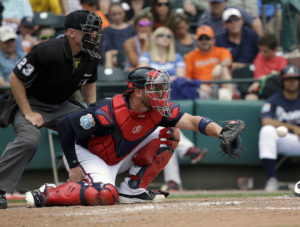
Clearly Tyler Flowers was on the team’s radar at the time, and I can’t imagine teams were lining up for Pierzynski. And even if they were, losing him would have meant losing, at best, a win or two off an at-best, 78-ish win, non-contending team. By signing Pierzynski both before trading Bethancourt and while eyeing Flowers, Atlanta bungled its handling of the C position. It was a small bungle, and it didn’t have repercussions that will hurt the team in the long run, but those kinds of moves are difficult to find with this management. This is my choice because it was a completely unnecessary signing at the time it happened, showing Atlanta’s hand to the other players in the room, and without any real upside to gain from it.
Andy Harris: The non-trades of Maybin and Grilli and the re-signing of Pierzynski may be mistakes, but they pale in comparison to the long-term damage to last summer’s big deadline deal.
Even though it was clear that Hector Olivera was not going to play for the Atlanta Braves ever again after his he served his suspension, the front office doubled-down on the debacle of the initial Olivera trade. In addition to having to play Matt Kemp, the Braves will end up paying an additional $25.5 million over the next three seasons for Kemp than what they would have paid by simply releasing Olivera.
To put it bluntly, there is absolutely no reason for Matt Kemp to be playing on a National League team. His outfield defense isn’t only bad, he has produced the worst defensive performance of any major league player over the last three years. Even in a season where he produced 35 home runs, his poor defense, poor baserunning, and poor on-base skills make him only a tick above replacement level. And unlike fine wine and cheeses, players like Kemp don’t tend to get better with age, and the Braves have him for his age 32-34 seasons at around $19 million per season (after subsidies from the Dodgers and Padres… two teams that are paying money for Kemp NOT to play for them).
Not only is Kemp a poor choice to play the field for Atlanta, he could possibly represent an opportunity cost for Atlanta as they move into what will hopefully be a long string of contending seasons. That one less place (and 19 million less dollars) that the team could use to sign a better player in free agency. One less place to potentially put a budding star from the farm if one should develop, be it Dustin Peterson, Mallex Smith, Ronald Acuna, or whomever.
Rebuttals
Chris Jervis: I almost went with Kemp’s acquisition as the worst move made by this front office. Doing so would have required me to ponder Hector Olivera a little more, and, well, I was out of bourbon.
Kemp’s price and inability to play defense are certainly concerns. He’s not going to get better. He’s probably not better than a replacement player when you consider overall contributions. But one thing Kemp does have is power, and that’s a skill that typically is able to be maintained even as a player ages. It’s also something that this team and organization lacked at most levels. Bringing Kemp in gave the team another viable bat in the lineup.
I don’t believe Kemp helped Freeman see better pitches, but I do believe he helped Freeman see pitches better. Freeman was already producing at All-Star levels before Kemp arrived, but the confidence from knowing he wouldn’t have to do it all himself seemed to really kick Freeman into another gear. And, despite being an aging star who was seeing his OBP decline, Kemp still had a reputation as a dangerous power hitter who could punish mistakes, and pitchers consider that when pitching.
Signing Pierzynski for 2016 was a bad move. He was 39 and had pretty clearly had an anomalous year in 2015. The likelihood of repeating, or even closely replicating, his performance was pretty low.
Of course, had the team traded him in 2015 at the peak of a near-career season, he probably would have been hanging around The Ballpark at Arlington in November, and the Rangers could have re-upped him. You know…if we hadn’t missed the opportunity to trade him.
Brent Blackwell: It’s hard to rebut Chris’s stance, because there’s no singular move to pinpoint. So, when it comes to Matt Kemp, I’m just not fully convinced it was a terrible move. Let’s go through the reasons.
First off, the arguments against Kemp are wholly related to his defense. Kemp has been an above average hitter for years, and that hasn’t changed. More pointedly, he brings a skill set – namely, power – that Atlanta is somewhat low on. Offensively, he’s a nice fit for Atlanta’s offense, particularly because he helps diversify things. So it comes down to defense. I’ll cede that his defense is bad, but I think there’s some question as to how bad it is. And I’m not the only one asking that question:
- Matt Kemp 2016 fWAR (Fangraphs): 0.7 (0.5 w/Atlanta)
- Matt Kemp 2016 bWAR (Baseball-Reference): 0.0 (0.0 w/Atlanta)
- Matt Kemp 2016 WARP (Baseball Prospectus): 2.1 (1.7 w/Atlanta)
The WAR calculators out there don’t agree on the best way to factor defense into the equation, and the different defensive metrics don’t even agree on how bad Kemp was (DRS had him at -18, FRAA at -9). Most of the very people who designed these statistics even warn that we have really just scratched the surface of defensive analysis, and teams likely have access to better means of measuring defense (like FIELDf/X). This concept of inside knowledge was hinted at when Atlanta traded Andrelton Simmons. If the team has found, through independent study, that defense either isn’t as important as some WAR valuations suggest, or that Kemp’s defense is closer to “bad” than “unplayable”, this deal isn’t just defensible – it’s actually pretty good. It rid Atlanta of not just a wasted roster spot, but an organizational embarrassment, and that’s a somewhat priceless element that can’t be ignored.
Andy Harris: Brent misrepresents the argument to simply defense, ignoring the bad contract and the bad OBP. Yes, right now Kemp is an above average hitter. I would not bank on that staying the same over the next three seasons, while the Braves continue to not be able to upgrade the position because we’re paying him over $19 million a season.
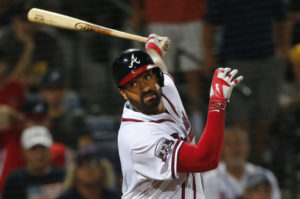
And while defense does remain the most difficult aspect of the game to quantify and defensive metrics are worthy of healthy skepticism, we’re not talking about a recent development. This is looking back at three years of performance, and no matter if you use UZR, DRS, or even the ‘ole “eye test”, Kemp has cost the teams he plays for more runs with his defense than any other player in major league baseball the last three years, and that’s not something to be hand-waved away. Right now he gets them back with the bat, but again I would not bank on that staying the same over the next three seasons.
Was re-signing Pierzynski a mistake? Certainly. But it was only a 1 year, $3 million mistake that does not impact the Braves window of contention in the slightest. Kemp is a 3 year, $57 million unforced error by the front office. That the likes of Mark Trumbo and Jose Bautista languish on the open market right now show that other GMs are properly valuing hitters like Kemp, and that value is not very high.
As for the “organizational embarrassment” Brent speaks of, that could have been just as well have been served by releasing him outright.
Judge: My decision of the winner can be found on the final page.

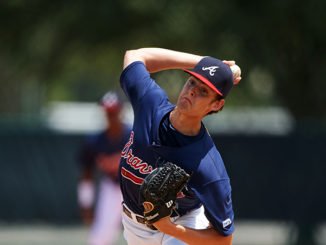
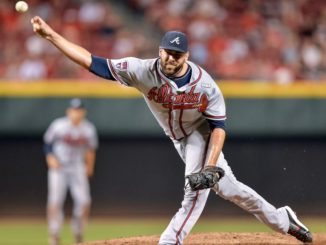
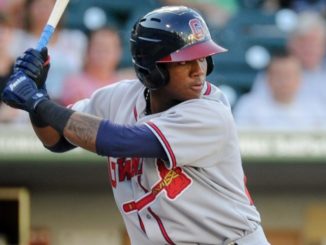
Leave a Reply